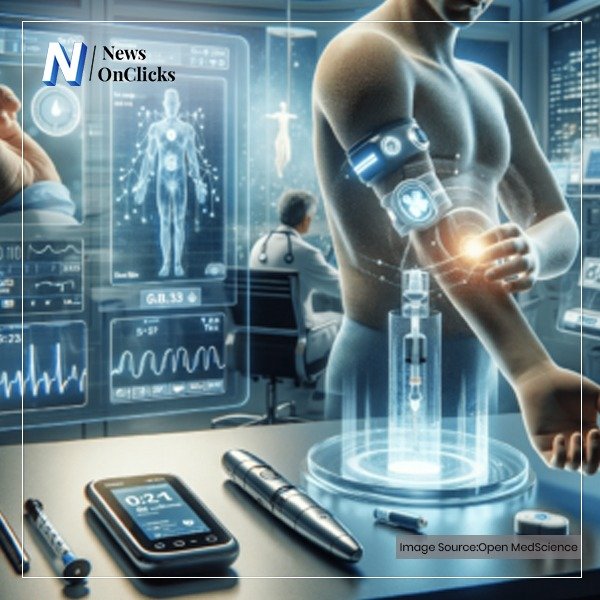
In a world where technology is reshaping every facet of life, its impact on diabetes management is nothing short of transformative. Once a condition defined by rigid daily routines and frequent hospital visits, diabetes care is evolving with the integration of digital health tools, artificial intelligence (AI), and wearable devices. These innovations are not only empowering patients but also enhancing the decision-making process for healthcare professionals. From continuous glucose monitors (CGMs) to AI-powered predictive analytics, the future of diabetes management is here.
Digital Health Tools: A New Era of Diabetes Care
Diabetes is a chronic condition that occurs when the body is unable to regulate blood sugar levels effectively. The rise of digital health tools has brought about a paradigm shift, making diabetes management more personalized and efficient. As Dr. Richa Chaturvedi, senior endocrinologist at Indraprastha Apollo Hospitals, notes, technology is significantly enhancing patient care and clinical practices by providing real-time data and continuous monitoring.
One of the key developments has been the move from traditional check-ups to continuous, data-driven care management. Gerald Jaideep, CEO of Medvarsity Online, explains that these tools are not just streamlining routine tasks—they’re changing the way healthcare professionals make clinical decisions. With 90% of endocrinologists and diabetologists considering upskilling in these technologies, it’s clear that digital tools are integral to improving patient outcomes and revolutionizing care delivery models.
Continuous Glucose Monitoring: The Smart Approach
At the forefront of this revolution are Continuous Glucose Monitors (CGMs), which allow patients to monitor their blood sugar levels in real time. This shift has minimized the need for frequent finger-stick tests and reduced the risk of dangerous fluctuations in blood sugar levels. Dr. Richa Chaturvedi highlights how CGMs are helping patients avoid risky highs and lows by providing constant feedback throughout the day. With the ability to track glucose trends and fluctuations, patients and doctors can make proactive adjustments to treatment plans.
Insulin pumps, which provide a steady dose of insulin throughout the day, are also simplifying diabetes management. Together with CGMs, insulin pumps are paving the way for closed-loop systems that act like an ‘artificial pancreas’. These systems automatically adjust insulin delivery based on real-time glucose readings, ensuring more stable blood sugar levels and significantly reducing the risk of complications like diabetic ketoacidosis.
AI and Predictive Analytics: Smarter Decision-Making
Artificial intelligence (AI) is also playing a pivotal role in diabetes management by providing predictive insights that empower patients and doctors alike. AI models analyze patient data, such as glucose levels, activity, and food intake, to predict potential issues before they arise. For instance, predictive analytics can warn of impending hypoglycemia (low blood sugar) or hyperglycemia (high blood sugar), giving patients the chance to intervene before their condition worsens.
AI also facilitates the personalization of treatment plans by identifying patterns in the data. By understanding how different interventions affect each patient, healthcare providers can tailor treatment strategies for optimal outcomes. This precision is a game-changer in a disease that requires constant management and adaptation.
Wearable Devices: Diabetes Care on the Go
Wearable devices are another game-changing innovation in the fight against diabetes. These devices, including smart insulin pens and activity trackers, offer real-time insights into a patient’s health metrics. For example, smart insulin pens track insulin usage and dosage history, helping patients and doctors optimize insulin delivery. Many of these devices can also sync with CGMs and other medical devices to deliver a more comprehensive view of a patient’s health.
Mobile health applications further complement this ecosystem, offering patients tools to manage their diabetes on the go. These apps provide guidance on nutrition, exercise, medication adherence, and glucose tracking, helping patients stay on top of their health without frequent visits to the doctor. By using AI-driven algorithms, many of these apps also provide personalized insights, offering practical suggestions for managing blood sugar levels based on individual data.
Telemedicine: Connecting Patients and Doctors
Telemedicine is another breakthrough that’s making diabetes management more accessible and convenient. Through virtual consultations, patients can connect with healthcare providers from the comfort of their homes. This is particularly beneficial for individuals who live in rural areas or have limited access to in-person care.
Telemedicine also enables remote patient monitoring (RPM), which allows doctors to continuously track a patient’s health metrics without requiring in-person visits. This proactive approach helps healthcare providers intervene early and make timely adjustments to treatment plans, improving patient outcomes and reducing the likelihood of emergencies.
Challenges and Considerations for Diabetes Management
While technology has brought about remarkable improvements, there are still challenges to overcome. Cost and accessibility remain significant barriers. Advanced diabetes management tools such as CGMs and insulin pumps can be expensive, and not all patients may have access to them. Moreover, data security is a growing concern as more patient information is digitized and shared across platforms. Ensuring the confidentiality and security of personal health data is crucial.
Another challenge is technology literacy. Some patients, especially older individuals, may find it difficult to use the complex devices and apps that are now integral to diabetes management. Therefore, patient education and support are essential to ensure everyone can benefit from these innovations.
The Road Ahead for Diabetes Management
The burden of diabetes is escalating globally, with India now home to the second-largest number of people living with diabetes. According to the International Diabetes Foundation (IDF), over 74.2 million adults in India have diabetes, a figure expected to rise in the coming years. As this number grows, so too will the demand for innovative solutions that make diabetes care more efficient, personalized, and accessible.
Dr. Varsha Kachroo, an endocrinologist at Yatharth Hospital, emphasizes that these technologies are not just improving patient care—they are empowering patients to take control of their health. With real-time data, personalized feedback, and enhanced engagement, patients are more involved in their treatment, leading to better outcomes. Moreover, these tools are enabling clinicians to offer more precise, proactive care, reducing complications and improving the overall quality of life for diabetes patients.
Conclusion
The integration of digital health tools, AI, wearable devices, and telemedicine is transforming the way diabetes is managed. These advancements are making care more personalized, efficient, and accessible, offering patients the tools they need to take control of their health. While challenges remain, the future of diabetes management looks promising, with technology leading the charge toward better outcomes and a higher quality of life for millions of people around the world.
Curious to know more about How Technology is Revolutonizing Healthcare? Click here!









